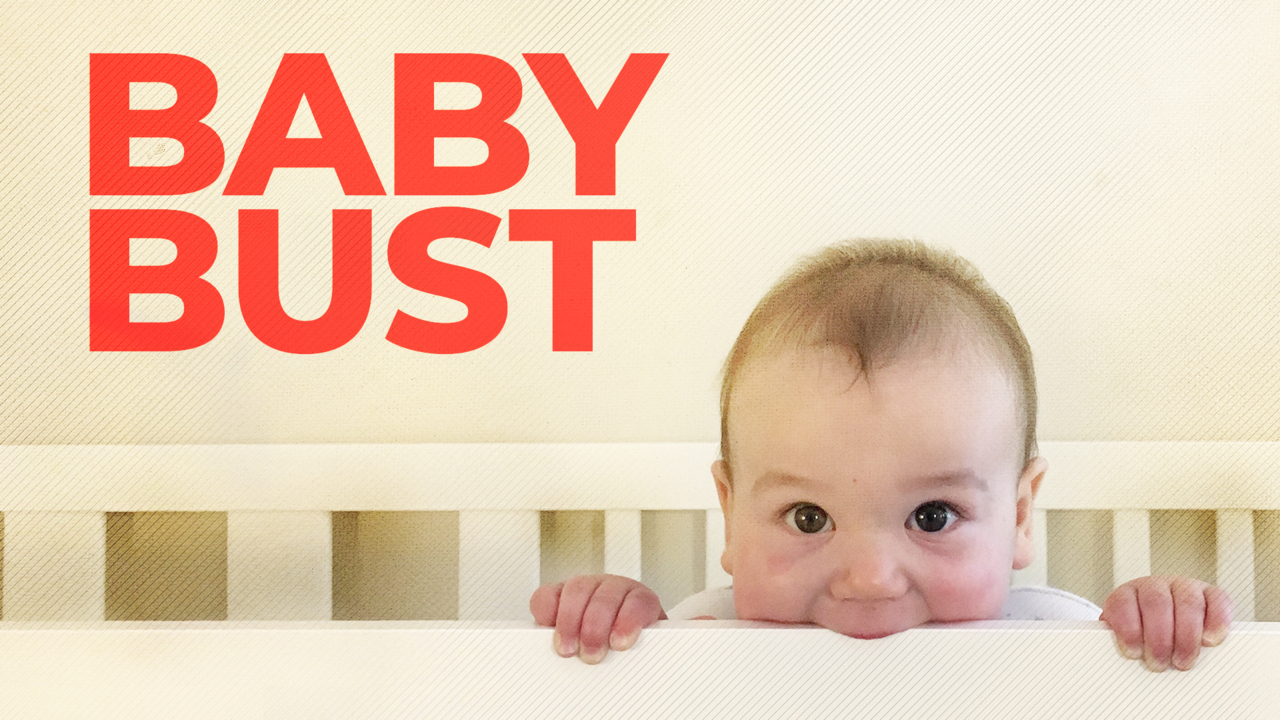
THE FUTURE OF THE WORLD IS LOOKING A LITTLE LESS CROWDED.
AFTER A PEAK IN 2007, US BIRTH RATES STARTED A STEADY DECLINE.
BUT THEN CAME THE PANDEMIC. MORE TIME AT HOME. MORE TIME TO…YOU KNOW.
BUT NOPE. IT ONLY ACCELERATED THE TREND. SURPRISED?
LET’S GET THIS STRAIGHT.
GOING RIGHT TO THE PANDEMIC’S SOURCE- COVID ITSELF is CAUSING some SHORT-TERM FERTILITY ISSUES.
Elizabeth Hatch: “Among males, when we looked at time since getting the infection, we found that within 60 days of having had the infection, they did have lower fertility.”
DR. ELIZABETH HATCH WAS PART OF A BOSTON UNIVERSITY STUDY THAT FOUND COUPLES WERE 18% LESS LIKELY TO CONCEIVE IF THE MAN TESTED POSITIVE FOR COVID WITHIN THE PRIOR TWO MONTHS.
ANOTHER VARIABLE IMPACTING FERTILITY CAN BE STRESS.
HATCH WAS ALSO PART OF A 2018 STUDY THAT FOUND WOMEN WITH HIGH LEVELS OF PERCEIVED STRESS HAD LOWER FERTILITY THAN THOSE WHO HAD LOW STRESS.
AND THERE WAS ABSOLUTELY HIGH STRESS DURING THE PANDEMIC.
THE AMERICAN PSYCHOLOGY ASSOCIATION LABELed 2020 A ‘MENTAL HEALTH CRISIS’.
BUT IS DIFFICULTY GETTING PREGNANT REALLY WHAT’S MOVING THE DIAL? PROBABLY NOT.
EVEN WHEN YOU FACTOR IN PANDEMIC STRESS… RESEARCH SUGGESTS IT PLAYED MORE INTO DELAYING CHILDREN BY CHOICE, NOT BY FORCE.
A MARCH 2021 HARRIS POLL SHOWS A QUARTER OF OLDER MILLENNIALS are CHOOSING TO DELAY HAVING CHILDREN DURING THE PANDEMIC.
AND THINK OF THE LAST FEW YEARS WE’VE HAD.
MILLIONS OF CANCELLED OR DELAYED WEDDINGS, THE HIGHEST UNEMPLOYMENT SINCE THE GREAT DEPRESSION, RISING HOME PRICES, OVERCROWDED HOSPITALS. IT’S…A LOT.
HATCH: “I do think probably a lot of young couples are changing their minds, and maybe not wanting to have kids or postponing it.”
Baumgardner: SHE’S RIGHT. AND STUDIES SHOW ADULTS DON’T WANT KIDS AS MUCH AS THEY USED TO. SOME NOT NOW, BUT A LOT, NOT EVER.
A PEW RESEARCH POLL FOUND 44 PERCENT OF CHILDLESS ADULTS WERE UNLIKELY OR NOT TOO LIKELY TO EVER HAVE KIDS. A MAJORITY STATING THAT THEY JUST DIDN’T WANT THEM..
AND IT’S NOT JUST AMERICA… BIRTH RATES ARE FALLING GLOBALLY FUELED IN PART BY MORE WOMEN IN THE WORKFORCE AND MORE ACCESS TO CONTRACEPTION.
COUNTRIES LIKE CHINA, JAPAN, AND ITALY EXPECT THEIR POPULATIONS TO BE HALF OR NEARLY HALF THEIR CURRENT SIZE BY THE YEAR 2100.
SO, WHILE THE PANDEMIC DIDN’T CAUSE THIS DECLINE, IN THE US OR ELSEWHERE, IT DEFINITELY DIDN’T HELP.
AND WITHOUT A MAJOR BABY BOOM IN THE FUTURE, IT REALLY WILL BE A SMALL WORLD AFTER ALL.









